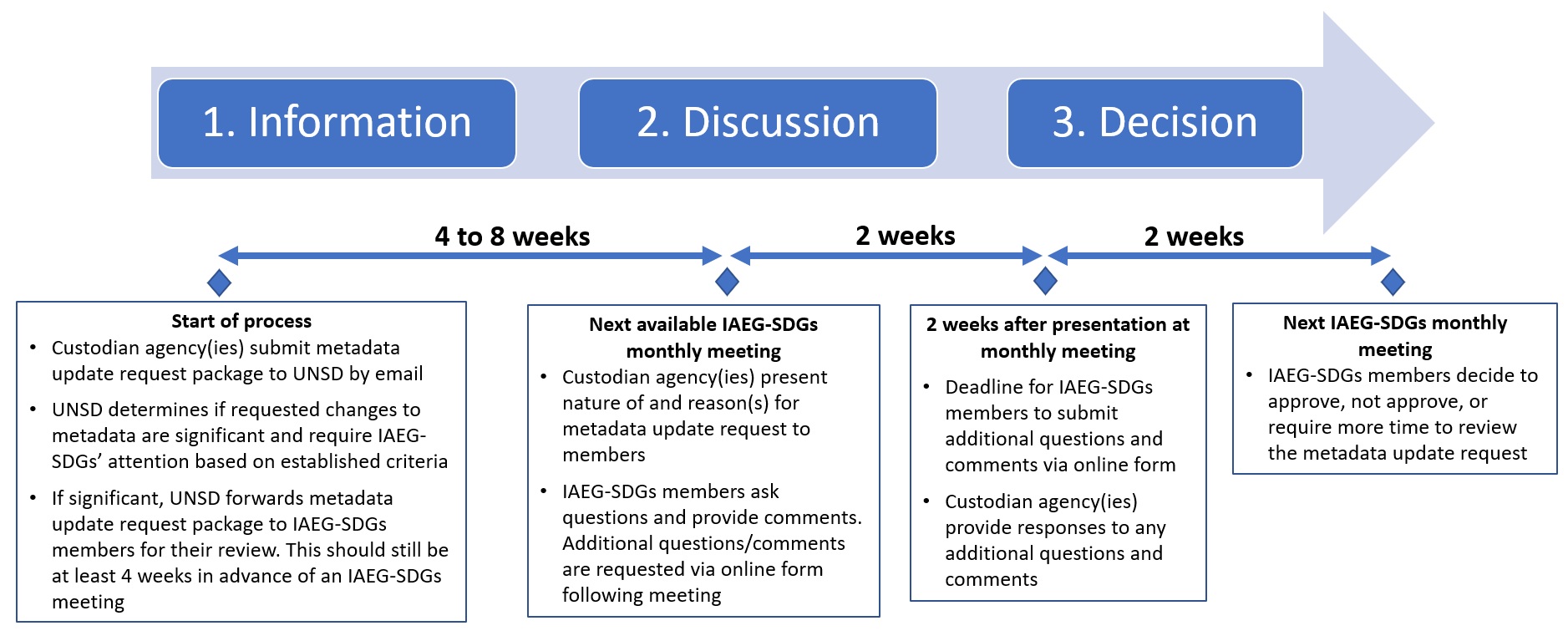SDG Indicators
Metadata repository
The metadata available in this repository is a work in progress. It reflects the latest reference metadata information provided by the UN System and other international organizations on data and statistics for the Tier I and II indicators in the global indicator framework. This repository will be further updated and periodically reviewed in cooperation with the respective data compilers.
In addition:
- Official list of Global Sustainable Development Goal indicators
- Tier Classification for Global SDG Indicators
- Previous Work Plans for Tier III Indicators (archive)
- Metadata for initially proposed indicators (archive)
Metadata update process:
Methodology for indicators is expected to update from time to time. For any metadata updates that include significant changes (detailed in the form below), the IAEG-SDGs will review the changes during its member meetings based on the update request form (see below) and track change metadata provided. Custodian agencies will also be invited to attend an upcoming IAEG-SDG member meeting to present on the proposed changes and answer any questions.
As requested by the IAEG-SDGs, custodian agencies must provide their metadata update request documents at least one month in advance of their next scheduled meeting to allow for sufficient time for review. Depending on the time of submission and the next IAEG-SDG member meeting, the timeline for review and approval can span up to 12 weeks or more. Therefore, it is important to provide submissions as soon as they are available. Please note that no data are published in the Global SDG Indicators Database until the corresponding metadata is approved by the IAEG-SDGs.
Please see below the projected stages and timeline.
To get started, custodian agencies are requested to:
- Download the metadata Word file for the indicator from the metadata repository (below) and edit the Word file in track changes to show the requested changes.
- Custodian agency downloads and completes the “Metadata update request form” (below) and sends the request package to sdgindicators@un.org.
Search
Goal 13. Take urgent action to combat climate change and its impacts[b]
Target 13.1: Strengthen resilience and adaptive capacity to climate-related hazards and natural disasters in all countries
- Indicator 13.1.1: Number of deaths, missing persons and directly affected persons attributed to disasters per 100,000 population
- Indicator 13.1.2: Number of countries that adopt and implement national disaster risk reduction strategies in line with the Sendai Framework for Disaster Risk Reduction 2015–2030
- Indicator 13.1.3: Proportion of local governments that adopt and implement local disaster risk reduction strategies in line with national disaster risk reduction strategies
Target 13.2: Integrate climate change measures into national policies, strategies and planning
- Indicator 13.2.1: Number of countries with nationally determined contributions, long-term strategies, national adaptation plans and adaptation communications, as reported to the secretariat of the United Nations Framework Convention on Climate Change
- Indicator 13.2.2: Total greenhouse gas emissions per year
Target 13.3: Improve education, awareness-raising and human and institutional capacity on climate change mitigation, adaptation, impact reduction and early warning
- Indicator 13.3.1: Extent to which (i) global citizenship education and (ii) education for sustainable development are mainstreamed in (a) national education policies; (b) curricula; (c) teacher education; and (d) student assessment
Target 13.a: Implement the commitment undertaken by developed-country parties to the United Nations Framework Convention on Climate Change to a goal of mobilizing jointly $100 billion annually by 2020 from all sources to address the needs of developing countries in the context of meaningful mitigation actions and transparency on implementation and fully operationalize the Green Climate Fund through its capitalization as soon as possible
- Indicator 13.a.1: Amounts provided and mobilized in United States dollars per year in relation to the continued existing collective mobilization goal of the $100 billion commitment through to 2025
Target 13.b: Promote mechanisms for raising capacity for effective climate change-related planning and management in least developed countries and small island developing States, including focusing on women, youth and local and marginalized communities
- Indicator 13.b.1: Number of least developed countries and small island developing States with nationally determined contributions, long-term strategies, national adaptation plans and adaptation communications, as reported to the secretariat of the United Nations Framework Convention on Climate Change
